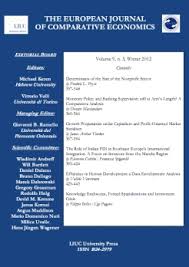
Factor Content of Intra-European Trade Flows
In recent decades, the international division of labor expanded rapidly in course of globalization. In this context, highly developed countries specialized on (human) capital intensively manufactured goods and increasingly sourced parts and components from lowwage countries. Since this should be beneficial for the high-skilled and harmful for the lower qualified workforce, especially the opening up of Eastern Europe and the international integration of newly industrializing Asian economies are considered as main reasons for increasing unemployment of the lower qualified in high-wage countries. The present paper addresses this issue for selected Western European countries by analyzing factor content of trade, which allows inferring on factor demand patterns resulting from international trade. This is not only done for countries’ total external trade, but also for bilateral trade flows, using input-output analyses. Thereby, differences in factor inputs and production technologies are considered, allowing for product differentiation. According to the results, factor content of bilateral trade flows between Western European high-wage countries does hardly differ. However, the results are different for East-West trade, since exports from Western to Eastern Europe are distinctly more human capital intensively manufactured than imports of Western European high-wage countries from Eastern Europe.





